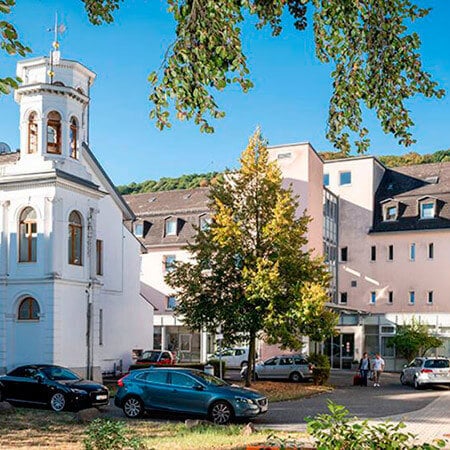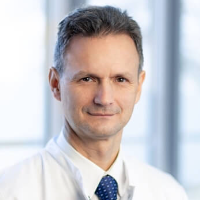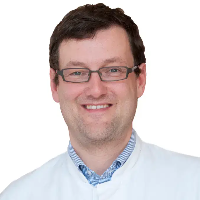Brachytherapy for Breast Cancer treatment in the Best Hospitals in the World
Treatment prices are regulated by national law of the corresponding countries, but can also include additional hospital coefficients. In order to receive the individual cost calculation, please send us the request and medical records.
Breast Cancer Treatment
- Diagnostics
- Reconstruction with an expander or allo prosthesis
- Diep-flap plastic reconstruction with own tissues
- Reconstruction with own tissue or implant after radical mastectomy
- Radical mastectomy
- Chemotherapy
- Lumpectomy and lymphadenectomy by metastases to lymph nodes
- Radiotherapy
- Sectoral resection with flap plastic
- Proton Therapy
- Embolization or chemoembolization

Department of Radiation Therapy and Radiation Oncology
The Department of Radiation Therapy and Radiation Oncology offers all types of modern radiation therapy for the highly effective treatment of benign and malignant tumors. The department is equipped with three linear accelerators and brachytherapy systems, which provide patients with the safest, most effective, and most sparing irradiation of tissues affected by oncopathology. The department also provides radiotherapy planning and radiosurgery. An ultramodern technical base, exceptional professionalism, and experience of the department's physicians are the cornerstones of successful clinical practice.





Department of Radiation Therapy
According to the Focus magazine, the Department of Radiation Therapy ranks among the top German medical facilities in the area of its specialization! The department offers all types of modern radiation therapy for cancer treatment at the highest level of university medicine. The priorities of the department's work include the treatment of tumors of the gastrointestinal tract, urogenital system in men, gynecological tumors in women, oncopathologies of the nervous system, as well as head and neck tumors. Each department's specialist strives to ensure all the patients with the most effective and at the same time customized treatment. Due attention is also paid to radiation protection.






Department of Radiation Therapy
According to the Focus magazine, the University Hospital of Ludwig Maximilian University of Munich is regularly ranked among the best medical institutions in Germany! The hospital is the largest multidisciplinary medical facility, as well as a leading research and training center in Germany and Europe. The hospital is proud of its bicentenary history and tirelessly confirms its primacy at the national and international levels. The outstanding quality of medical care is complemented by highly productive research activities, thanks to which many effective diagnostic and therapeutic methods, saving people’s lives, have been presented in medical practice.






Breast cancer is the disease most commonly experienced by women. It would be a mistake to call breast cancer a purely age-related disease: modern medicine knows cases of breast cancer in nulliparous women and young mothers under the age of 30.
The risk of a breast cancer development increases with the biological aging of the body and changes in the natural female cycle, therefore mammologists and gynecologists recommend a routine examination 1-2 times a year.
Brachytherapy for breast cancer
First applied in practice over 100 years ago, brachytherapy is a method to treat breast cancer from the inside out. It is a precise, highly effective, and well-tolerated therapeutic method of breast cancer treatment that reduces the risk of undesirable damage to healthy tissues and organs, as well as the likelihood of side effects, making it a valuable addition to any radiation oncology program.
Brachytherapy is a type of breast radiation therapy in which tiny amounts of radioactive material sealed in catheters, wires, needles, or seeds are placed directly into the tumor tissue. Due to the precise placing the radiation sources into the tumor, high doses can be applied to small areas. Brachytherapy is commonly used in the medical treatment of breast cancer as monotherapy or as a boost therapy in addition to external beam therapy. However, it may also be used as part of the cancer treatment procedures, such as head and neck cancer, lung cancer, GI tract cancer, and prostate cancer.
Brachytherapy involves the delivery of radioactive elements directly to the tumor without the influence of radiation on the entire organ and adjacent healthy tissues. Radiation therapy is very effective at killing breast cancer cells while sparing the normal surrounding tissue. It is generally performed after the surgical removal of the breast tumor. This treatment is one component of a comprehensive medical treatment plan.
This targeted breast cancer treatment allows radiologists to significantly reduce the number and severity of side effects after irradiation, facilitate the recovery period, and make the patient's stay in the clinic as short as possible. Unlike radiation therapy, brachytherapy in breast cancer treatment is performed in one course.
Radiation oncology treatment at cancer stages 1 and 2 demonstrates excellent positive statistics – the 5-10-year survival rate of women, which in oncology is equated to full recovery, is observed in 75-90% of cases.
At the same time, about 4% of the patients, who underwent the radiation oncology treatments as an alternative to the operation, had to resort to mastectomy caused by tumor recurrence. However, this once again indicates the need for a personalized approach to each specific case of oncology and the selection of the optimal individual treatment protocol.
Types of brachytherapy for breast cancer treatment
Brachytherapy may be temporary or permanent.
Temporary brachytherapy includes placement of radioactive material inside a catheter for a certain amount of time and removing it afterwards. It is divided into a low-dose-rate (LDR) and high-dose-rate (HDR) procedures.
- Low dose-rate (LDR) brachytherapy uses sources of Cesium-137 and Iridium, among others. In this method, an "applicator" is placed in a body or inside a tumor, and a radiation source is inserted into the applicator when the patient stays in a shielded room. The patient remains in an isolated room until the source is removed from the body. This process often requires hospitalization.
- High dose-rate (HDR) brachytherapy can be performed with miniaturized Cobalt-60 or Iridium-192 sources that allow high dose rates to be delivered, that ultimately shortens a hospital stay period. Therefore, HDR brachytherapy can be performed as an outpatient treatment. Brachytherapy is one of the main components of radiation oncology for the medical treatment of breast cancer. Other indications for brachytherapy include prostate cancer, breast cancer, soft tissue sarcomas, some head and neck tumors, and skin cancer.
Permanent brachytherapy is also called seed implantation. It includes putting radioactive seeds (about the size of a grain of rice) inside or near the tumor permanently. After several months, the seeds lose their radioactivity.
Before any radiation oncology treatment a patient needs to undergo a complete diagnostic examination so that specialists can study all the characteristics of the tumor – its size, degree of malignancy, and exact localization. The procedure itself is performed on an inpatient or outpatient basis, depending on the selected method of high dose or low dose brachytherapy.
How is the brachytherapy carried out?
When treating breast cancer, radiation therapy is often combined with surgery when the certain part of the breast has been removed or when cancer cells are found in lymph nodes near the breasts. The goal of postoperative radiation therapy is to destroy microscopic small cancerous colonies that remain in the surgical site or nearby lymph nodes.
After partial breast removal, breast radiation therapy reduces risk of the local recurrence, prolongs the healthy period, and reduces breast cancer mortality. If chemotherapy is prescribed after surgery, then radiation therapy is given after it.
Dose planning and target of radiation oncology treatment for breast cancer are done after computed tomography. Radiation therapy is planned for each patient individually.
While planning the dosage of radiation therapy, it is preferable to reduce the radiation doses to healthy tissues, such as the lungs and heart, which are located near the target site of radiation therapy. To minimize the radiation dose to the heart, radiation therapy on the left side of the chest is performed while holding the breath while inhaling or while controlling the breath.
Benefits and side effects of brachytherapy
Radiotherapy plays an essential role in breast-conserving treatment, and external beam irradiation is the most widely used its modality. However, brachytherapy can deliver radiation doses in the targeted region, thereby minimizing exposure of normal surrounding structures.
The use of modern imaging technologies like CT, or even ultrasound and MRI, together with sophisticated treatment planning software, has further improved the accuracy of individualized medical treatments.
Brachytherapy is an option for patients who undergo radiation therapy treatment for an early stage of breast cancer and have several favorable tumor characteristics. These include a small tumor and no evidence of cancer in the lymph nodes. Radiation therapy of the lymph nodes in the armpit, along with other risk factors such as removal of the lymph nodes, can worsen lymph circulation and lead to swelling of the upper limb.
Temporary side effects, such as redness and possible flaking of the skin and breast edema, often occur during radiation oncology treatments, but usually disappear within a month after medical treatment completion. Potential late side effects may occur months or years after breast cancer treatment.
Inflammation of the lungs caused by radiation therapy is a rare but possible postprocedure reaction after radiation therapy for breast cancer. In most cases, this adverse reaction will resolve over time.
The cost of brachytherapy
With Booking Health services, you can book brachytherapy for breast cancer at a affordable price. The cost of the procedure varies in different countries. We can arrange a trip for treatment at fair price. The cost of brachytherapy for breast cancer goes as follows:
- Germany – from 24,000 EUR
- Turkey – from 20,000 EUR
Where can I undergo brachytherapy for breast cancer treatment abroad?
Among foreign hospitals, the best success rates in brachytherapy for breast cancer treatment are demonstrated by:
- MediClin Robert Janker Clinic, Bonn, Germany. The Department of Radiation Therapy and Radiation Oncology offers radiation therapy planning and radiosurgery. The department’s service range is complemented by brachytherapy.
- Medicana International Ankara Hospital, Ankara, Turkey. The Department of Radiation Oncology and CyberKnife Treatment specializes in intensity-modulated radiation therapy, intraoperative radiation therapy, and brachytherapy. It has the most advanced technologies for breast cancer treatment and diagnostics.
- University Hospital Frankfurt am Main, Frankfurt am Main, Germany. The Department of Radiation Therapy ranks among TOP German medical facilities in its area of specialization. It annually treats more than 1,300 patients with oncopathology, and this figure continues to rise.
How can I undergo brachytherapy treatment abroad?
The self-organization of breast cancer treatment abroad can be overwhelming. It requires specific knowledge and experience in medical tourism. It is safer, easier, and less stressful to shift some responsibility onto a medical tourism agency.
Booking Health is the largest and most transparent medical tourism agency in the world. Medical treatment abroad is arranged due to the direct cooperation with leading foreign hospitals.
Booking Health provides the following services:
- Selection of treatment program and medical facility
- Communication with the clinic
- Reducing the overall cost of treatment procedures
- Translation of medical documents
- Help in applying for a visa for the patient and accompanying person
- Flight and accommodation booking
- Interpreting services
To undergo breast cancer treatment abroad for a reasonable price, please leave a request on our website. The medical tourism coordinator will contact you during few hours.

